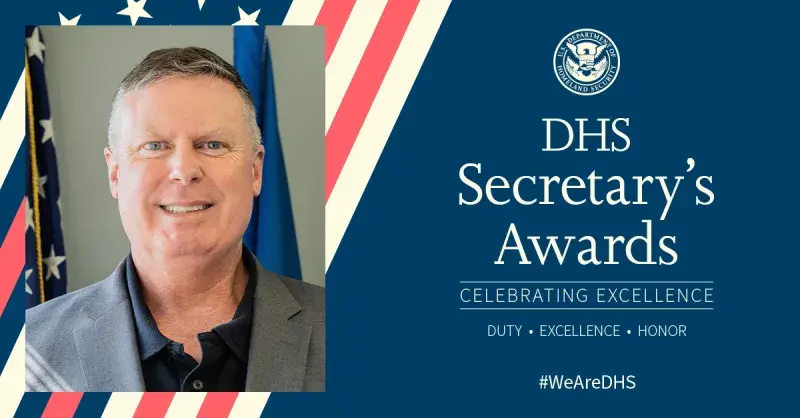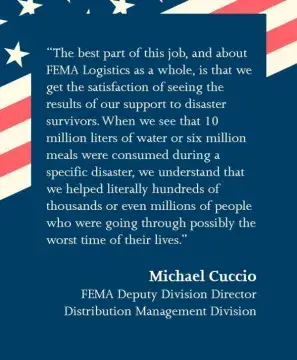
Did you know that plastic bottles of water have an expiration date? Maybe you thought bottles of water have an unlimited lifespan. However, after two years, bottled water stockpiled by the Federal Emergency Management Agency (FEMA) actually expires. As you can imagine, those responsible for purchasing lifesaving and life-sustaining commodities must manage the delicate balance of buying enough supplies to be prepared for emergencies without buying too much leading to waste.
When Michael Cuccio joined FEMA as the Supply Chain Integration Branch Chief two and a half years ago, he realized there was room to evaluate the agency’s current procurement practices for both water and the meals they provide during disaster response. Prior to his arrival, his new team had already started exploring options for water delivery that didn’t include bottled water, but they did not commit to a new product.

“My branch started experimenting with 40-year cans and five or 10-year boxes of water ahead of my arrival, but they were much more expensive, so they did not purchase much of it,” said Cuccio. “We also had millions of bottles of water in our Distribution Centers. We were constantly putting it on “excess” – attempting to sell it to other federal agencies – to get rid of it before it expired. If it did expire, we had to have the vendor destroy the expired water and bring the empty bottles to a landfill or a recycling center. This cost the taxpayers more money than purchasing the water in the first place.”
This was a driving factor in the switch to a new water supply product. Cuccio said his team started buying more 10-year boxed water, especially when the price for boxed water decreased to near the cost of plastic bottles.
“It was at that point that I decided to solely buy 10-year boxed water for storage in the Distribution Centers,” said Cuccio, who served in the U.S. Marine Corps for 30 years. “We only purchase plastic bottles in cases where we need to make the purchase very quickly during an active disaster.”
But why is boxed water, which is more expensive than bottled water, a better option?
According to Cuccio, clear plastic bottles have potentially harmful chemicals which can leach into the water, especially if the bottles are stored in hot climates. This leads to a very short shelf life for bottles of water, which isn’t a concern for boxed water. Empty water bottles also end up in landfills or recycling centers.
“Boxed water is not cheaper per bottle, but the government saves a ton of money in the long term,” Cuccio explained. “During periods of no disasters, when FEMA cannot cycle its water stocks, we would have to excess or destroy half of our stocked water every year. In [the Continental U.S.] alone, this would amount to approximately $4.5 million per year that we would have to spend to replenish this water. By using 10-year boxed water, this expense goes down to near zero as the chances of cycling this water through disaster response over a 10-year period is much greater.”
In addition to the changing the type of water they purchased, Cuccio and his team also changed the type of meals they purchased to Humanitarian Daily Ration (HOR) meals. These meals, which come in two-meal daily ration packages, are packaged with 20 meals in a box versus the other meal types that come in boxes of 12 or 16. This allows the team to store 25 - 30% more meals in that same amount of space that traditional meals would take up.
Additionally, these meals are vegetarian – which are more palatable to segments of the population that either do not consume meat or have dietary limitations based on cultural and religious restrictions – and do not contain magnesium heaters which end up in landfills.
“Each of these initiatives saves the government money (taxpayer dollars) and both are better for the environment than the previous business model,” said Cuccio. “I want to balance what makes best logistical sense with what is best for the taxpayer. You can achieve both if you put your mind to it.”
Food and water are not the only supplies provided during a disaster.
Cuccio also co-led the efforts to order and distribute over 300 million pieces of personal protective equipment items - fulfilling disaster requests from 50 States, 26 Tribes, and six Territories in response to the nationwide COVID 19 disaster and National COVID Vaccination Campaign. Concurrent with his water and meal improvements and COVID logistics, Cuccio led work in his branch and the NRCC to respond to five major hurricanes, two wildfire disasters, and the 2021 Texas Winter Storm.
“In most disasters, water and meals are the most critical items, but we also send tarps, plastic sheeting, generators, and shelter kits of various types – cots, blankets, consumable medical supplies, infant and toddler supplies, etc...” Cuccio said. “The type of disaster definitely has an impact on what resources are requested by the State, Territory, or Tribe.”
Cuccio explained that even though 2021 was a busy year for his team in the Supply Chain Integration Branch, they fully understand that what they do has a great impact on FEMA’s support to disaster survivors. Knowing the effect they have in our communities is what keeps them motivated.
“They have great pride in their accomplishments,” he said. “Like in chess, we always need to stay a few steps ahead of the next disaster. We are always thinking of replenishing the Distribution Centers, even while pulling items out to support an active disaster.”
Cuccio, who is now serving as the Deputy Division Director for the Distribution Management Division, wasn’t expecting an award for these initiatives, and said he would rather his entire team get an award for the work they do.
“I am humbled and honored to have been considered for this award,” he said. “Again, I wish my whole team could equally be recognized. Nothing I did was done alone. The Supply Chain Integration Branch is a great team, and I am proud of what they have done over the past two years with the COVID Pandemic and numerous other disasters that they have been asked to support.”
Visit the Recognizing DHS Excellence page for more stories about this year’s awardees.
